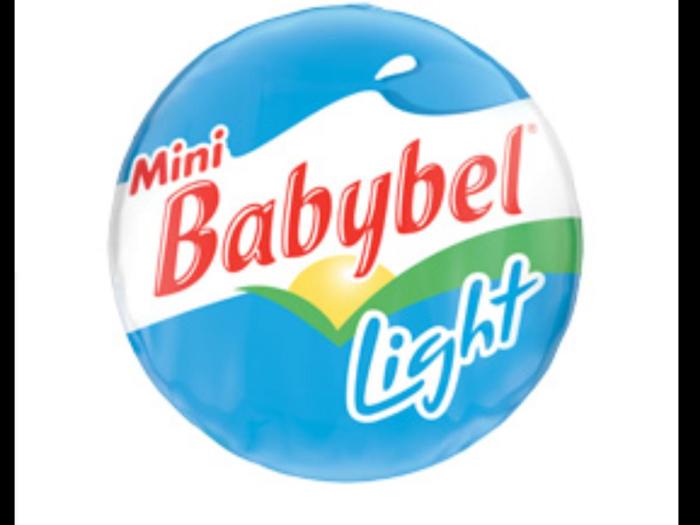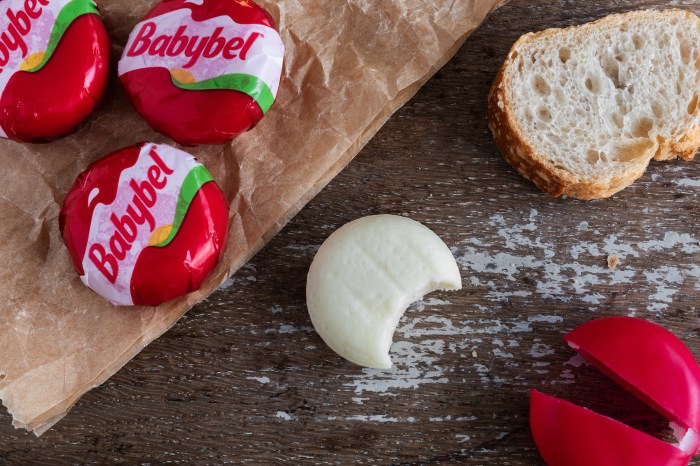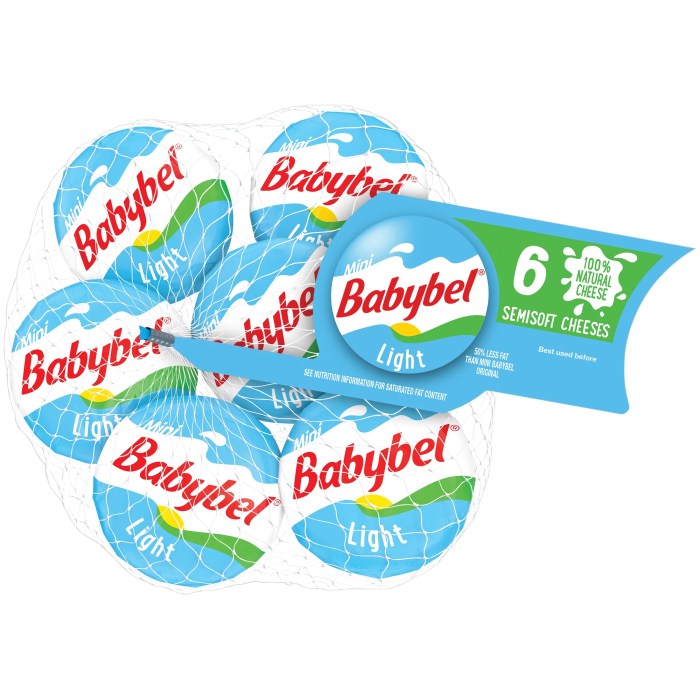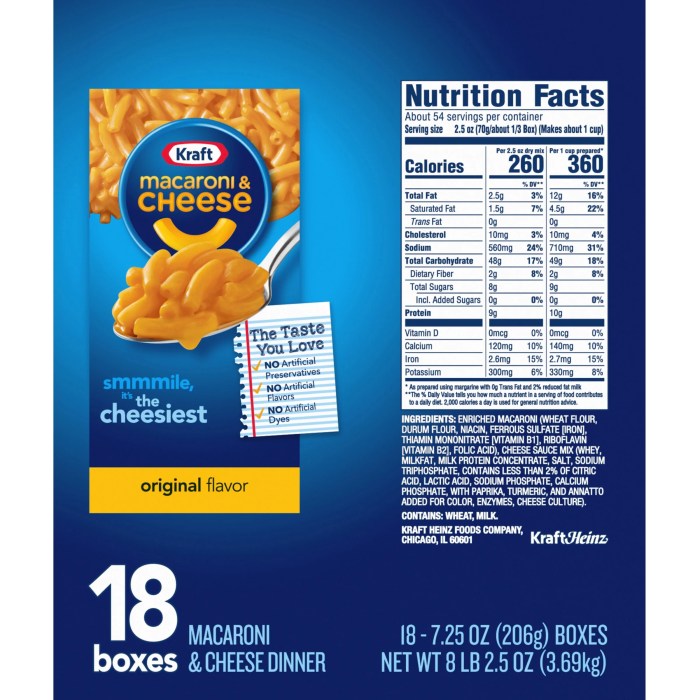Nutritional Content of Babybel Light Cheese

Babybel light cheese nutrition – Babybel Light cheese offers a lower-calorie alternative to the original Babybel while still providing a satisfying cheesy snack. Understanding its nutritional profile is crucial for making informed dietary choices. This section details the macronutrient and micronutrient composition of Babybel Light cheese, comparing it to the regular version.
Macronutrient Breakdown per Serving
A typical serving of Babybel Light cheese (one mini wheel) contains approximately 35 calories. The macronutrient breakdown varies slightly depending on the specific flavor, but a general approximation includes:* Protein: Around 4 grams. Protein is essential for building and repairing tissues.
Fat
Approximately 2 grams. Fat contributes to satiety and provides essential fatty acids, although moderation is important in a balanced diet.
Carbohydrates
Less than 1 gram. This low carbohydrate content makes Babybel Light suitable for low-carb diets.
Vitamins and Minerals in Babybel Light Cheese
Babybel Light cheese is a source of several essential vitamins and minerals, contributing to overall health and well-being. The following table provides an approximate breakdown per serving:
| Nutrient | Amount per Serving (approx.) | Unit | % Daily Value (approx.) |
|---|---|---|---|
| Calcium | 100-150 | mg | 10-15% |
| Vitamin A | 10-20 | mcg | 1-2% |
| Vitamin B12 | 0.5-1 | mcg | 2-5% |
*Note: Daily values percentages are approximate and can vary based on individual daily caloric needs.*
Nutritional Differences between Babybel Light and Regular Babybel Cheese
The key difference lies in the reduced fat and calorie content. This is achieved through modifications in the cheese-making process.
- Fat Content: Babybel Light cheese significantly reduces the fat content compared to regular Babybel. This translates to a lower calorie count per serving.
- Calorie Content: Babybel Light cheese contains fewer calories per serving than regular Babybel cheese.
- Protein and Calcium: While the fat content is reduced, the protein and calcium content remain relatively similar in both versions, making Babybel Light a good source of these essential nutrients even with lower calories.
- Sodium Content: The sodium content may vary slightly between the two versions, but generally remains within a similar range.
Comparison with Other Light Cheese Options: Babybel Light Cheese Nutrition

Babybel Light cheese offers a convenient and portable option for those seeking a lower-fat cheese. However, its nutritional profile should be compared to other light cheese alternatives to determine its place within a balanced diet. This comparison considers factors such as fat content, protein, sodium, and calcium.
Babybel Light cheese offers a delightful, convenient way to enjoy a lower-calorie snack. If you’re curious about comparing its nutritional profile to other cheeses, a quick look at the detailed breakdown of monterey jack cheese nutrition might be interesting. Returning to Babybel Light, its portability and satisfying taste make it a perfect choice for a healthy, on-the-go treat.
The following table compares the nutritional information of Babybel Light cheese with three other popular light cheese brands. Note that nutritional values can vary slightly depending on the specific product and serving size. Data presented here is based on average values from readily available product information.
Comparative Nutritional Analysis of Light Cheeses
| Cheese Brand & Type | Serving Size (g) | Calories | Fat (g) | Saturated Fat (g) | Protein (g) | Sodium (mg) | Calcium (mg) |
|---|---|---|---|---|---|---|---|
| Babybel Light | 20g | 60 | 3.5 | 2.0 | 6 | 150 | 180 |
| Laughing Cow Light | 20g | 50 | 2.5 | 1.5 | 5 | 120 | 150 |
| Kraft Light Singles | 28g | 70 | 4.0 | 2.5 | 7 | 200 | 200 |
| String Cheese (Light Variety – Example Brand) | 28g | 80 | 4.5 | 2.8 | 7.5 | 180 | 220 |
Note: These values are approximate and may vary depending on the specific product and manufacturer. Always check the nutrition label on the packaging for the most accurate information.
Advantages and Disadvantages of Babybel Light Cheese Compared to Alternatives
Babybel Light cheese offers the advantage of individual portion control, making it convenient for snacking. Compared to Laughing Cow Light, it has slightly higher fat and sodium content, but also more calcium. Compared to Kraft Light Singles, Babybel Light provides fewer calories and less sodium per serving, although Kraft offers a larger portion size. The example String Cheese (Light variety) shows higher fat, calories, and protein, with similar calcium to Babybel.
The choice depends on individual priorities. For example, someone watching their sodium intake might prefer Laughing Cow or Babybel over Kraft. Someone prioritizing protein might prefer the String Cheese option.
Criteria for Selecting a Light Cheese Based on Nutritional Needs
A well-informed choice of light cheese requires considering several factors. Prioritizing specific nutritional goals guides selection.
The following points Artikel key criteria:
- Fat Content: Individuals aiming to reduce dietary fat should choose options with the lowest fat grams per serving. Consider the types of fat, with a preference for cheeses lower in saturated fat.
- Sodium Content: Those watching their sodium intake should select cheeses with lower sodium milligrams per serving. This is particularly important for individuals with hypertension.
- Protein Content: For individuals focusing on protein intake, a higher protein content per serving is desirable, contributing to satiety and muscle building.
- Calcium Content: Calcium is essential for bone health. Choose cheeses with higher calcium content to support bone density.
- Calorie Content: For weight management, lower calorie options are preferable. Consider the calorie content per serving in relation to the portion size.
Visual Representation of Nutritional Information

Visual representations are effective tools for quickly understanding the nutritional composition of food products. By presenting data graphically, key aspects of a food’s nutritional profile become immediately apparent, aiding in informed dietary choices. The following descriptions illustrate how visual aids can clarify the nutritional content of Babybel Light cheese.
Macronutrient Composition of Babybel Light Cheese
A pie chart would effectively illustrate the proportion of macronutrients (fat, protein, and carbohydrates) in a single serving of Babybel Light cheese. The chart would be divided into three segments, each representing the percentage of a macronutrient. For example, if a serving contains 2g of fat, 6g of protein, and 1g of carbohydrate, the fat segment would occupy a proportionally smaller area than the protein segment, reflecting the higher protein content.
The carbohydrate segment would be the smallest. The chart’s legend would clearly label each segment with the macronutrient name and its corresponding percentage of the total serving. The use of distinct colors for each segment would enhance visual clarity and make the comparison readily apparent.
Calorie Comparison: Babybel Light vs. Regular Babybel Cheese, Babybel light cheese nutrition
A simple bar graph provides a clear comparison of the calorie counts between a single serving of Babybel Light cheese and a similar serving of regular Babybel cheese. The graph would have two vertical bars, one for each cheese type. The height of each bar would correspond to the number of calories per serving. The x-axis would label each bar as “Babybel Light” and “Babybel Regular,” while the y-axis would represent the calorie count.
A clear numerical scale on the y-axis would enable easy comparison of the calorie difference between the two cheese options. The visual difference in bar height would instantly highlight the reduced calorie content of the light version.
Quick FAQs
Is Babybel Light cheese suitable for lactose-intolerant individuals?
While it contains less lactose than regular Babybel, it’s not entirely lactose-free. Individuals with severe lactose intolerance may experience digestive discomfort.
Does Babybel Light cheese contain any artificial sweeteners?
The ingredient list should be checked for specific information as formulations may vary. Generally, Babybel Light cheese relies on reduced fat content for its lower calorie count rather than artificial sweeteners.
Can children consume Babybel Light cheese?
While generally safe for children, moderation is key. Consult a pediatrician for dietary advice tailored to a child’s specific needs and age.
How long can Babybel Light cheese be stored once opened?
Once opened, it should be refrigerated and consumed within a few days to maintain freshness and quality.



